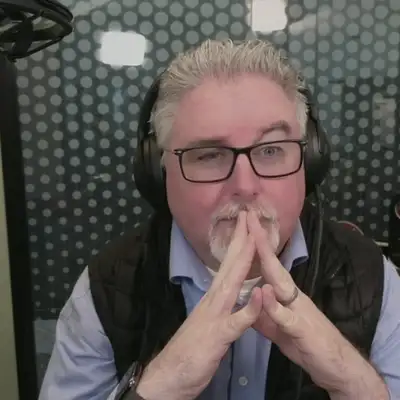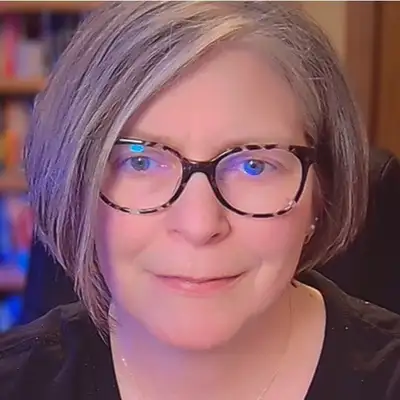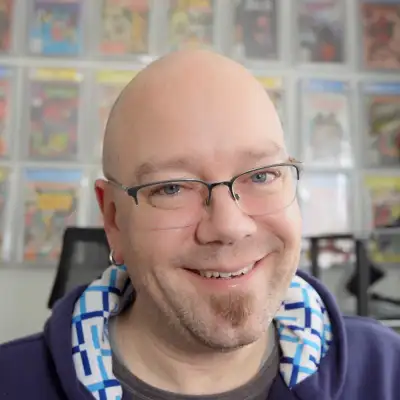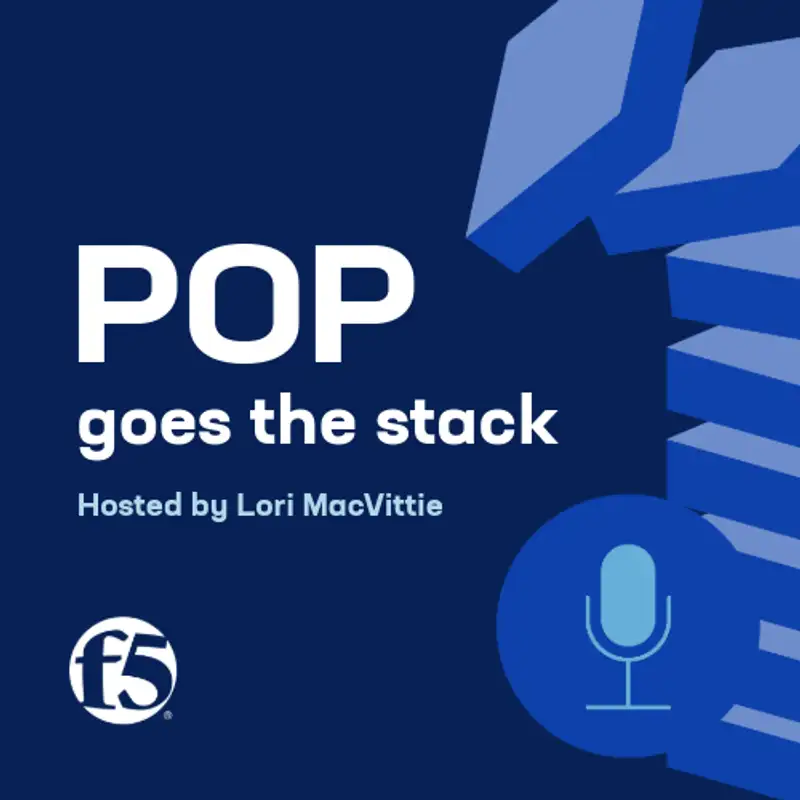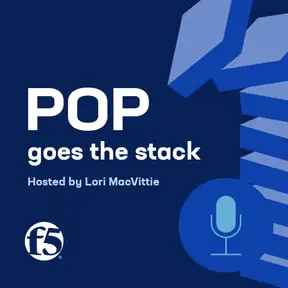Now Streaming: Your Status Updates
00:00:05:29 - 00:00:29:15
Lori MacVittie
Hey, everyone. This is Pop Goes the Stack, where emerging tech trends go to be unpacked, interrogated, and occasionally roasted. I'm your host, Lori MacVittie. Still waiting for an AI that understands sarcasm. And I've got Aubrey King this week. And co-host Joel Moses, who may or may not be AI generated. Say hi.
00:00:29:18 - 00:00:32:18
Joel Moses
Hello. How are you?
00:00:32:21 - 00:00:33:16
Aubrey King
Hi.
00:00:33:18 - 00:00:34:17
Joel Moses
And now do you.
00:00:34:21 - 00:00:36:14
Aubrey King
Joel is totally AI generated.
00:00:36:18 - 00:00:43:12
Lori MacVittie
Don't think so. He'd have a better voice if he was. Which is, perfect. Possibly.
00:00:43:15 - 00:00:46:21
Joel Moses
Thanks, Lori. Thanks. I appreciate that. Yeah.
00:00:46:24 - 00:00:47:23
Lori MacVittie
Oh, that made him feel bad.
00:00:47:24 - 00:00:54:16
Aubrey King
No, that isn't possible. And I got to tell you, it's a it's been a secret until now, but I fall asleep to Joel's voice every night.
00:00:54:18 - 00:00:56:12
Lori MacVittie
Oh, that is.
00:00:56:12 - 00:00:57:13
Aubrey King
Soothing.
00:00:57:16 - 00:00:58:11
Lori MacVittie
It's so sweet.
00:00:58:15 - 00:01:00:19
Joel Moses
Nobody tell my wife right.
00:01:00:21 - 00:01:34:03
Lori MacVittie
All right, let's, let's actually talk about, what Google did recently. They decided that we didn't really want answers. We wanted a podcast about our questions. So they have audio overviews, and it's an AI generated summary read aloud like a status update from a very chipper intern who thinks bar graphs are passé. So we're going to talk about the slow death of dashboards, the rise of narrative driven interfaces, that scares me.
00:01:34:06 - 00:02:01:17
Lori MacVittie
And what happens when even your status updates come with background music and maybe a hey there vibe? Yeah. Well, it is, it's, you know, once we started talking about we need AI assistants so we can, you know, interact with our infrastructure, with our applications or APIs, our systems in a more natural way. Come on. It was always going to go to voice, right?
00:02:01:18 - 00:02:03:24
Lori MacVittie
I mean, it's what we want.
00:02:04:01 - 00:02:20:23
Joel Moses
Yeah. You know, for those who don't know what we're talking about, you can go into your Google search labs right now. So just off of, Google, you can search for, for Google Labs. And one of the elements is called search lab. And so these are projects that they, that they do to kind of enhance their search engine, portfolio.
00:02:20:23 - 00:02:52:14
Joel Moses
And they added this audio overviews, but they kind of, it doesn't just give you an overview in some cases, in order to make the, I guess, the answer more entertaining, it formats it like a podcast with two hosts. Yeah. Yammering at each other. Does it sound familiar to you in any way, Lori? So, you know, it's a it's a novel way of expressing the answers to your questions, but, you know, it takes 40, roughly 40s to generate this, this podcast approach.
00:02:52:16 - 00:03:00:12
Joel Moses
And I'm not really sure it's that much more efficient at conveying information, which I guess is an object lesson for those of us that do podcasts, isn't it?
00:03:00:13 - 00:03:04:21
Lori MacVittie
I, I feel attacked and seen at the same time I'm conflicted.
00:03:04:22 - 00:03:05:28
Joel Moses
I don't yeah.
00:03:06:00 - 00:03:06:14
Lori MacVittie
I know.
00:03:06:17 - 00:03:08:09
Joel Moses
That's typical of AI technologies.
00:03:08:11 - 00:03:34:07
Lori MacVittie
Yeah. It's interesting. I mean, for I think it's an interesting experiment to do it on search because that's obviously what Google does. Yeah. Right. But when you start thinking about things like, you know, your, you know, your status updates, you know, what's what happened last night in the SoC. You know, maybe for an executive who is, you know, got a busy morning or, you know, doing coffee, maybe they want to listen to that instead of read it.
00:03:34:07 - 00:03:37:04
Lori MacVittie
I mean, is that something we want?
00:03:37:06 - 00:04:01:17
Joel Moses
I mean, I'll tell you one thing. I really like about it. And I'll tell you one thing I absolutely hate about it. I'll start with the hate. Because that's where you naturally go. I don't like that this seems like, the death of the podcast. You know. I don't like that. Like, I like I like to hear opinions from real people, and, you know, having someone tell me the answer to the question that I asked directly.
00:04:01:17 - 00:04:20:18
Joel Moses
But format it like a podcast seems to cheapen the value of the opinion expressed in podcast. So I don't like it from that perspective. But what I do like about it is it is an attempt by Google, I think. I don't know, I wasn't there, but I was it's an attempt for them to address, the learning styles that people have.
00:04:20:18 - 00:04:40:24
Joel Moses
And some of those learning styles are different. An auditory learning style, being able to listen to something and gain better understanding than seeing it written is definitely a thing. And I think that, the answer to your question being read back to you in, in kind of a singsong way, helps some people grasp the information better.
00:04:40:24 - 00:04:47:09
Joel Moses
And so any anything that can help, a nontraditional learner, I think is, is a good thing.
00:04:47:12 - 00:04:58:17
Aubrey King
I, I said to you guys, before we started recording that, I feel like that the amount of time is sort of unreasonable. I feel like I could actually vibe code a program to tell me how to do the thing.
00:04:58:23 - 00:05:00:12
Joel Moses
40s is too long for you Aubrey?
00:05:00:16 - 00:05:11:13
Aubrey King
But that's the thing. If I ask somebody a question, if I said, hey, how are you doing today? And it took them 40s while they stared at me and went, that's not going to work. You know, it just doesn't.
00:05:11:15 - 00:05:15:16
Lori MacVittie
You have teenagers. I mean, come on. Like it's.
00:05:15:18 - 00:05:21:04
Aubrey King
Yes, I do, and I do get that sometimes I do accuse him of being AI as well occasionally.
00:05:21:07 - 00:05:49:28
Joel Moses
They remind me a little bit of the early days of web search where, results were not instantaneous like they are today, where, you know, you could sit in front of the AltaVista search engine and it might take 40s for your, your query to come back. But, yeah, I, I found myself kind of waiting and that was, that was, a little uncomfortable from a search experience. I imagine, because this is, a labs, a labs engine that's being tested here that they'll work on the performance of it.
00:05:49:28 - 00:05:55:11
Joel Moses
And this is just the first cut. But it points the way to what they're thinking in the future, I think.
00:05:55:13 - 00:06:20:08
Lori MacVittie
Well, when we saw, like, AI start. Right, it's always been like, it's got to think, right. Oh, I thought for 20s, even now, if you take that and you open an app on your phone and you hit a button and it takes 20s, you're already calling somebody and canceling. Right. We're just we don't tolerate it. But with AI, we started tolerating it in part, I think, because we attribute more human characteristics.
00:06:20:08 - 00:06:40:14
Lori MacVittie
Oh, it's thinking we'll give it a second. Be patient. Right. So it's actually changing our tolerance for latency in some situations. So maybe that wait isn't that bad. Hey, if I don't have to read two screens and it's just going to tell me. Yeah, you know, maybe I don't care.
00:06:40:16 - 00:07:08:11
Joel Moses
That that juxtaposes with what you want to really talk about, which is kind of the slow death of the dashboard in the AI world. You know, if the information can be expressed to you with just a little bit of waiting and you don't have to watch a dashboard to light up instantaneously and instead there's an AI assistant that is highlighting for you the information that you particularly find relevant based on other interactions it's had with you that that's, that's interesting.
00:07:08:12 - 00:07:11:15
Joel Moses
That's an interesting, aspect to this technology.
00:07:11:17 - 00:07:42:21
Aubrey King
You know, the, the voice thing, like, I think you said it, Lori, it was always going to go this way. It has to. I mean, we've got AI robots coming, and they need to be able to communicate with us how we communicate with each other. But at the same time, you know, I've had instances in my when I was okay going way back when I was still in, you know, a production environment, working, you know, in, in, service provider 40s could be the difference between a massive outage and a good day.
00:07:42:24 - 00:08:05:05
Aubrey King
So to me, I look at that and go, this, this is, you know, it's it's still coming. And I think you're right, Joel, I do I think we're going to see the performance get better. Because of exactly the things that we're seeing. And as far as dashboards are concerned, what that makes me think of is, again, back going back to the production time in my career, we had the thing called Nagios, right?
00:08:05:05 - 00:08:22:12
Aubrey King
Which told us what was going on in the environment. And I can't tell you how helpful it would have been to have had Nagios pop up on some speakers somewhere and say, hey, we got an outage on, you know, Mail Store 35 or whatever. That would have been very, very handy.
00:08:22:15 - 00:08:24:21
Joel Moses
That used to be your job though, right?
00:08:24:23 - 00:08:25:29
Aubrey King
Watch dashboard.
00:08:26:02 - 00:08:29:16
Joel Moses
Watch the dashboard and then get on the speaker and tell everybody about it.
00:08:29:19 - 00:08:58:20
Lori MacVittie
Well, but that's always been a problem. I mean, dashboards are multiple visualizations and text. And one of the challenges in data visualization has always been how do we convey this information to different audiences? Because someone steeped in understanding network or infrastructure metrics is going to be able to read a visualization very differently than an executive. So how do you bridge that in a single dashboard?
00:08:58:21 - 00:09:20:08
Lori MacVittie
Well, you don't or you have 20 of them and now it's just become a confusing mess. But being able to just say, hey, this means X or that means y and this is not good, maybe. Right, that that at least higher level right that we need. And then you could drill down. I think you'll still have those visualizations.
00:09:20:08 - 00:09:31:07
Lori MacVittie
You have to see what's going on. But maybe that first line is more a hey, something's wrong. There's an outage brewing. That node is flapping. What's going on?
00:09:31:09 - 00:09:50:08
Joel Moses
You know, I think that we're we're on the cusp of something brand new, which, you know, observability tools have always been about: Find it first and then show it to me and then visualize it for me and help me understand its context. And now I think we're into what you described, Lori, at the very beginning, which is a narrative driven interface.
00:09:50:11 - 00:10:10:01
Joel Moses
Now, don't just show it to me. Explain it to me. Give me give. Package it all together. Tell me what I'm seeing. And connect it. To connect it together with other things that exist within the dashboard. A dashboard is a single pane of glass, right? Have we all heard the single pane of glass?
00:10:10:05 - 00:10:11:08
Aubrey King
I've never heard this before.
00:10:11:08 - 00:10:35:17
Joel Moses
You know, seeing a single pane can only contain however much real estate that you have on the screen. But the context of an outage, for example, could be something that exists across multiple screens. You can only fit so much on a single pane of glass. So narrative driven interfaces give you the ability to connect things that are off screen that are not on that single pane of glass to what you're seeing on the screen.
00:10:35:20 - 00:10:39:09
Joel Moses
And that that's, that's that's a pretty exciting advancement.
00:10:39:11 - 00:10:43:00
Lori MacVittie
Is that pane p-a-I-n or p-a-n-e.
00:10:43:03 - 00:10:50:10
Joel Moses
Whatever works, Lori. Whatever works. Yeah. I I've, I've been pained by many a dashboard in my life.
00:10:50:11 - 00:10:51:11
Lori MacVittie
Yes.
00:10:51:13 - 00:11:09:19
Aubrey King
I feel like what we're really asking for here is the Star Trek computer. Right. It's just. Yes, "Computer, show me X" and it can still show you that piece of glass or the dig down, because I'm not going to say the whole pane of glass, a piece of glass from the pane. And if you just ask for it.
00:11:09:19 - 00:11:20:09
Aubrey King
And again, I feel like that's coming as well. This, this whole thing really signals this verbal communication between ourselves and machines.
00:11:20:12 - 00:11:50:13
Lori MacVittie
Why? It's I think it's it's the ability to question it more than just the, the voice like it tells you. Hey, you know, this this app is failing. Well, what does that mean? Right? Connect it, as Joel said, to things like business outcomes. Right. That disconnect has always existed. And it's very hard for someone whose primary role is just to keep a bunch of different right pieces of infrastructure running and available to go,
00:11:50:15 - 00:12:14:25
Lori MacVittie
there's the business outcome because, you know, sometimes they're not aware or they're not steeped in it and they don't really connect the dots. So being able to say, hey, we need to do something because we're about to lose, you know, $1 million a second. Yeah. Right. Is a valuable thing. It helps prioritize. So being able to ask, well, what's the impact of that is really what we want.
00:12:14:25 - 00:12:23:07
Lori MacVittie
Is that back and forth without having to go, where's Joel. And I need an answer to this because I don't, you know, is this important, you know.
00:12:23:07 - 00:12:53:16
Joel Moses
Right, right. Yeah. It's pretty exciting. I again, I think we're seeing the first kernels of some of this in just generic search results. You know, in a Google Labs project. But, the, the I like what I see into it to some degree. I don't necessarily enjoy the presentation. I don't want every single one of my search results to be read back to me by two very chipper, podhost co co-hosts, but, you know that it is what it is.
00:12:53:19 - 00:13:24:27
Joel Moses
And it's an experiment. It's an experiment. But I think it points the way to what, what you're talking about. The slow death of the dashboard is the central piece of monitoring infrastructures or understanding, you know, the context of your email inbox. And, you know, the rise of narrative driven interfaces where it connects together, things that you don't see on the dashboard with things that are off the dashboard, things like business value or this is what business impact something is, is having.
00:13:24:29 - 00:13:29:16
Joel Moses
I'm going to be really interested to see how that's balanced Well.
00:13:29:19 - 00:14:01:24
Lori MacVittie
I, balance. But one of the things I like about that, we talk about how nice it would be to be able to interact with operations and ask questions and, you know, get a summary, whether it's a podcast or maybe, you know, it's just a voice telling us, but what we're not really digging into is like that lower level like, sure, this sounds all great, but the the foundation for this observability, there has to be AI, there has to be systems connected.
00:14:01:24 - 00:14:18:22
Lori MacVittie
There has to. Right? There has to be so much laid down to get this to work in the first place. Like we're already at the this is what I want, but we don't realize how much work has to go into it. Right? This is not just slapping it on the front end.
00:14:18:24 - 00:14:19:06
Joel Moses
Right?
00:14:19:13 - 00:14:41:23
Aubrey King
You know it. This also again going way back. For me in the Wayback machine, that we had a situation in one of my employers where we lost a lot of employees. So we had to, basically automate everything within a, period of very little time. I mentioned the Nagios thing, right? We had a couple other ticketing systems also that were, you know, request tracker, things like that.
00:14:41:23 - 00:15:14:16
Aubrey King
If anyone knows the open source community. But one of the things that made that possible for us to scale as we, as we had less and less employees was IRC. Okay. So we had a IRC server and we had bots back then that were plugged into Request Tracker that were plugged into, you know, our Nagios and whatnot, and they would pop up and give us a summary like, hey, this machine is doing bad, and here's what's going on as a result of that, or you have a new ticket in queue, please take care of it.
00:15:14:16 - 00:15:39:03
Aubrey King
It's nine days old. Whatever. It would be so great if I could have had that speak to me. And and just for the sheer fact of I wouldn't have to constantly have eyes on it. And I do. I really like that. I appreciate that, and I can't, frankly, I can't wait for that to to actually hit and be usable with less than 40s of wait time.
00:15:39:06 - 00:15:41:23
Aubrey King
You know?
00:15:41:25 - 00:16:21:29
Lori MacVittie
Yeah, that's I mean. IRC, slack. Discord.
Aubrey King
Slack. Yeah.
Lori MacVittie
Yeah. All of these have. Right. Easy, well, fairly easy if you know how to code. Right. Mechanisms for inserting new functionality, building bots that you can invite in, that you can do things with. It's not a stretch to go. Maybe that's part of the the communication framework that AI, at least in an operational sense, is going to need to use is something that's a little bit more multimodal, but then also, right, flexible, familiar and extensible, because these things are going to be you're going to have to plug in all sorts of interesting things.
00:16:22:01 - 00:16:40:28
Aubrey King
I like what you're saying here, honestly, especially mentioning slack. I mean, if I don't know if you guys have seen it, but we've got these new labs for DevCentral right now that, where we're building AI and agentic flows and things like that. And one of the first things that I could use N8N to tie in with an agent for is slack.
00:16:41:04 - 00:16:51:17
Aubrey King
So to be able to also tie in to maybe, a ticketing system, this is giving me ideas maybe for a new lab that that'd be nice.
00:16:51:19 - 00:17:13:12
Joel Moses
Yeah. You know, I think I think the auditory cues is is an important aspect of this. One thing auditory cues give you is the ability to hear them in the background without complete and total focus. Like even with even with slack, if you want to see the alerts, you have to be watching for the alert. It doesn't instantaneously show it to you.
00:17:13:15 - 00:17:32:16
Joel Moses
Whereas with an audio cue, you can kind of not be focused on it. You can just have it be it can be in the background, but it will alert you to something, without without you giving complete and total focus to it. So auditory interfaces I think, are going to be very important for, for dashboard style systems to, to really be come into their own in the AI era.
00:17:32:19 - 00:17:56:26
Lori MacVittie
Yeah. So I think that's important about the auditory cues because we're so inundated with alerts and sounds and notifications from our phone. There's this one ding dong, you know, bing bang, pop, you know, weird things. But yeah, exactly. You can't even identify, right, what they are anymore. And you start just getting, like, I don't even need to pay attention to it.
00:17:57:02 - 00:18:23:15
Lori MacVittie
But when someone speaks. Right. As human beings, we have a natural tendency to focus more on human speech. Because someone's talking to me. I need to pay attention as opposed to this ding dong. So I think that's important that this is a good thing to go there. Also, just for capturing people's attention to things that are more important as long as we don't overuse them and turn everything into a podcast, right.
00:18:23:18 - 00:18:36:22
Joel Moses
So we've delved into a lot of different things here, auditorially. So what about the three things we want to have people take away from all of this? Aubrey. What three things did you learn?
00:18:36:24 - 00:18:41:09
Aubrey King
Boy, I learned that Joel is AI. No I,
00:18:41:12 - 00:18:41:27
Joel Moses
You're right.
00:18:42:03 - 00:19:04:04
Aubrey King
You know, honestly, it this, as far as learning it, it's really made me think about the this dashboard concept. It's not something that I really kind of gave any, any thought to about how we interface with, you know, with the things that are supposed to notify us, you know. So, yeah, for me, it's just that there is a new option coming.
00:19:04:04 - 00:19:07:05
Aubrey King
That's not just a ding.
00:19:07:07 - 00:19:08:23
Joel Moses
And, Lori.
00:19:08:25 - 00:19:30:01
Lori MacVittie
What did I learn? I heard a ding. Wait. I'm distracted. That was my. That was my phone. And I don't know what it was because it happens so often. We turn them off, right? So, three things we learned. I think two of them. One, this is this is cool. We are moving toward it. Right?
00:19:30:01 - 00:19:49:28
Lori MacVittie
This is it's going to happen. I think that's the thing that that I've learned, right? This was kind of sci fi two years ago. Hey, we could. And now it's actually starting to happen. There's a lot more offerings that are providing these kind of, like, voice interactions into different kinds of systems. We're figuring that out. So going to happen.
00:19:50:05 - 00:20:14:06
Lori MacVittie
Very cool. And the second one that I learned, just digging, you know, digging in and thinking about it is really the complexity underneath that. It sounds very cool. Hey, it's just an SDK. Plug it in. No, if we want to use it within operations, it's going to take a lot more planning, more foundation, a lot of integration, you know, and probably some strategy and and thinking about it.
00:20:14:09 - 00:20:36:12
Joel Moses
Yeah. I think my biggest takeaway from this is that, Google has taught us that you can take the most humdrum of things on the internet, the, certainly the humble search result. And you can produce, a new format of it. And I think that, the application of AI technologies to things that are extremely long in the tooth and overdue for a reboot, is pretty exciting.
00:20:36:12 - 00:21:03:12
Joel Moses
So, you know, search labs is out there, and, this is this is the audio overview feature, but they've got other features there that are increasingly being driven by AI, AI feature sets. And so I think this is definitely a place to watch the intersection of the, the venerable search infrastructures, alongside, new ways to represent information that comes from it is is an exciting step forward.
00:21:03:14 - 00:21:23:10
Lori MacVittie
Absolutely. It is cool. It is it is very cool. And I, I love seeing, right that move toward now we just need a repository of voices so we can select the correct one for operations. Yes, yes we do. That's that's should be a question everyone asks is who's the right voice for your operations?
00:21:23:12 - 00:21:24:13
Joel Moses
Christopher Walken.
00:21:24:16 - 00:21:25:26
Lori MacVittie
There.
00:21:25:28 - 00:21:27:00
Joel Moses
Yeah that's it.
00:21:27:02 - 00:21:27:15
Lori MacVittie
All right.
00:21:27:15 - 00:21:29:16
Joel Moses
I want all my alerts in Christopher Walken's voice.
00:21:29:22 - 00:21:31:06
Aubrey King
Samuel L Jackson.
00:21:31:09 - 00:21:51:24
Lori MacVittie
Oh, wow. All right. Well, that's a wrap for Pop Goes the Stack this week. If you enjoyed today's interrogation, smash subscribe, and then try emailing and I some sarcasm. You'll get why we're still needed. We'll be back to grill the next shiny thing next week.
Creators and Guests
